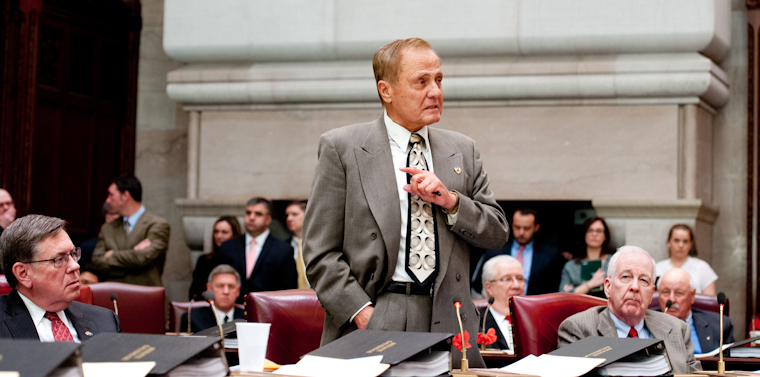| Date of Action |
Assembly Actions -
Lowercase Senate Actions - UPPERCASE |
|---|---|
| Jan 08, 2014 |
referred to judiciary |
| Mar 18, 2013 |
referred to judiciary |
Senate Bill S4271
2013-2014 Legislative Session
Sponsored By
(R, C, IP) Senate District
Archive: Last Bill Status - In Senate Committee Judiciary Committee
Actions
2013-S4271 (ACTIVE) - Details
2013-S4271 (ACTIVE) - Sponsor Memo
BILL NUMBER:S4271
TITLE OF BILL: An act to amend the family court act, in relation to
child support arrears accrued prior to applications to modify child
support orders in supreme or family court
This is one in a series of measures being introduced at the request of
the Chief Administrative judge upon the recommendation of her Family
Court Advisory and Rules Committee.
In 1986, while enacting a comprehensive Governor's Program Bill
entitled the "New York State Child Support Enforcement Act of 1986,"
the Legislature amended sections 451(1) and 460(1) of the Family Court
Act to "[p]rohibit the cancellation or reduction of arrears for child
support and allow reduction or cancellation of arrears for spousal
support only upon a showing of "good cause." See Memorandum of
Support, L. 1986, c. 892. This Memorandum explained that:
This provision would make sure respondents are not "rewarded" by
reduction or forgiveness of arrears when they fail either to pay the
required support or to seek modification of the order. Arrears for
spousal support can be forgiven or reduced by a court in which case
the facts and circumstances constituting such good cause shall be set
forth in a written memorandum of decision.
The Governor's Memorandum of Approval stated that the legislation
2013-S4271 (ACTIVE) - Bill Text download pdf
S T A T E O F N E W Y O R K
________________________________________________________________________
4271
2013-2014 Regular Sessions
I N S E N A T E
March 18, 2013
___________
Introduced by Sen. BONACIC -- (at request of the Office of Court Admin-
istration) -- read twice and ordered printed, and when printed to be
committed to the Committee on Judiciary
AN ACT to amend the family court act, in relation to child support
arrears accrued prior to applications to modify child support orders
in supreme or family court
THE PEOPLE OF THE STATE OF NEW YORK, REPRESENTED IN SENATE AND ASSEM-
BLY, DO ENACT AS FOLLOWS:
Section 1. Subdivisions 2 and 5 of section 455 of the family court
act, as amended by chapter 533 of the laws of 1999, are amended to read
as follows:
2. Except as provided in article five-B of this act, any respondent
against whom an order of commitment has been issued, if financially
unable to comply with any lawful order issued under this article, upon
such notice to such parties as the court may direct, may make applica-
tion to the court for an order relieving him or her of FUTURE payments
directed in such order and the commitment order. The court, upon the
hearing on such application, if satisfied by competent proof that the
respondent is financially unable to comply with such order may, upon a
showing of good cause until further order of the court, modify such
order and relieve the respondent from the commitment order. NO SUCH
MODIFICATION SHALL REDUCE OR ANNUL CHILD SUPPORT ARREARS ACCRUED PRIOR
TO THE MAKING OF AN APPLICATION PURSUANT TO THIS SECTION. No such
modification shall reduce or annul unpaid sums or installments OF OTHER
ARREARS accrued prior to the making of such application unless the
defaulting party shows good cause for failure to make application for
relief from the order directing payment prior to the accrual of such
arrears. Such modification may increase the amount to be paid pursuant
to a lawful order issued under this article nunc pro tunc based on newly
discovered evidence.
EXPLANATION--Matter in ITALICS (underscored) is new; matter in brackets
[ ] is old law to be omitted.
LBD09329-01-3
Comments
Open Legislation is a forum for New York State legislation. All comments are subject to review and community moderation is encouraged.
Comments deemed off-topic, commercial, campaign-related, self-promotional; or that contain profanity, hate or toxic speech; or that link to sites outside of the nysenate.gov domain are not permitted, and will not be published. Attempts to intimidate and silence contributors or deliberately deceive the public, including excessive or extraneous posting/posts, or coordinated activity, are prohibited and may result in the temporary or permanent banning of the user. Comment moderation is generally performed Monday through Friday. By contributing or voting you agree to the Terms of Participation and verify you are over 13.
Create an account. An account allows you to sign petitions with a single click, officially support or oppose key legislation, and follow issues, committees, and bills that matter to you. When you create an account, you agree to this platform's terms of participation.
